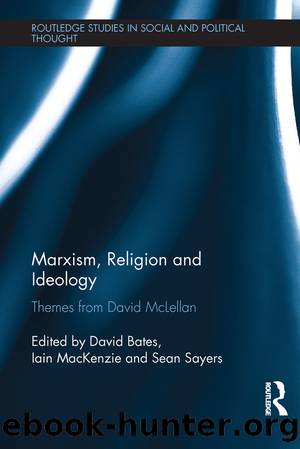Marxism, Religion and Ideology: Themes From David McLellan by David Bates & Iain MacKenzie & Sean Sayers

Author:David Bates & Iain MacKenzie & Sean Sayers [Bates, David & MacKenzie, Iain & Sayers, Sean]
Language: eng
Format: epub
ISBN: 9781138850613
Google: AqXIoQEACAAJ
Goodreads: 26536474
Publisher: Routledge
Published: 2015-10-06T00:00:00+00:00
Feuerbach
Regarding the young Marx, David McLellan once asked if Marx was a Feuerbachian.14 Engels had written of The Essence of Christianity, âone must have experienced the liberating effect of this book to get an idea of it. Enthusiasm was general; we all became at once Feuerbachiansâ.15 By the Paris Manuscripts, Marx claimed to have moved beyond Feuerbachâs contemplative materialism. Feuerbach had said that âIn the object which he contemplates ⦠man becomes acquainted with himselfâ,16 whereas Marx linked this contemplation to productive activity; âMan contemplates himself in a world he himself has createdâ.17
Marx continued this advance on Feuerbach into politics, arguing that human freedom is a practical and not a philosophical, conscious act; a point made most tellingly against Stirner who really believed freedom or âownnessâ was a purely conscious affair. In this respect, however, was Marx right to distance himself so much from Feuerbach? Polemically, they have much in common. It would be hard to decide, without knowing, whether it was Feuerbach or the young Marx who wrote the following:
The Philosophy of the Future addresses itself to the task of leading philosophy from the realm of âdetached soulsâ back to the realm of embodied living souls; of compelling philosophy to come down from its divine and self-sufficient blissfulness in thought and open its eyes to human misery.18
As to humanism, McLellan points out that âwhat struck Marx most about The Essence of Christianity was the âhumanismâ of the bookâ,19 specifically the notion of manâs integral being:
Feuerbach did not intend to exalt any one aspect of man at the expense of others: he wanted man to reclaim for himself the whole of his being, including the religious itself. Such specific borrowings by Marx, as can be traced to Das Wesen des Christentum all have this slant.20
Feuerbachâs recasting of Godâs predicates in human form resurrects aspects of manâs integral nature hitherto suppressed by religious thinking. Feuerbach insists man is a sensual as well as a thinking being. Nor did he fail to include manâs active, dynamic side. On these points, the essay Philosophy of the Future compares Leibniz unfavourably with a theist outlook. To the former, the divine intellect was indeed ânothing but pure intellectâ, whereas theism âdirectly links sensuous and material effects with the thought and will of Godâ.21 As to Hegel, Feuerbach asks if his âpure and presuppositionless thought is no more than the Divine Being of the old theology and metaphysics which has been transformed into the actual, active, and thinking being of man?â22 âThe question of being is indeed a practical questionâ23 says Feuerbach, adding that art and science, (forms of active materialism in the Marxian sense?), inhere in âthe true being of manâ24 as much as religion and philosophy; and that philosophy must âunite itself with natural scienceâ.25 Truth itself, concludes Feuerbach, âdoes not exist in thought, nor in cognition confined to itself. Truth is only the totality of manâs life and beingâ.26 The difference between Feuerbach and Marxâs materialism, in respect of being active, may be one of degree rather than kind.
Download
This site does not store any files on its server. We only index and link to content provided by other sites. Please contact the content providers to delete copyright contents if any and email us, we'll remove relevant links or contents immediately.
International Integration of the Brazilian Economy by Elias C. Grivoyannis(110139)
The Radium Girls by Kate Moore(12018)
Turbulence by E. J. Noyes(8040)
Nudge - Improving Decisions about Health, Wealth, and Happiness by Thaler Sunstein(7693)
The Black Swan by Nassim Nicholas Taleb(7109)
Rich Dad Poor Dad by Robert T. Kiyosaki(6612)
Pioneering Portfolio Management by David F. Swensen(6288)
Man-made Catastrophes and Risk Information Concealment by Dmitry Chernov & Didier Sornette(6007)
Zero to One by Peter Thiel(5786)
Secrecy World by Jake Bernstein(4741)
Millionaire: The Philanderer, Gambler, and Duelist Who Invented Modern Finance by Janet Gleeson(4465)
The Age of Surveillance Capitalism by Shoshana Zuboff(4275)
Skin in the Game by Nassim Nicholas Taleb(4239)
The Money Culture by Michael Lewis(4198)
Bullshit Jobs by David Graeber(4179)
Skin in the Game: Hidden Asymmetries in Daily Life by Nassim Nicholas Taleb(3991)
The Dhandho Investor by Mohnish Pabrai(3759)
The Wisdom of Finance by Mihir Desai(3735)
Blockchain Basics by Daniel Drescher(3574)
